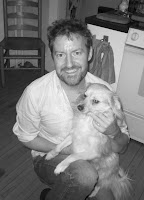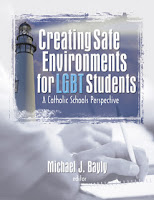. . . That conscience must rule is consistent with what all of us former priests learned in seminary. It is also consistent with what I taught college students in social justice classes during the '60s at the archdiocesan minor seminary. When discussing human rights, I included Pope John XXIII's teaching that every person possesses the right to honor God "according to the sincere dictates of his own conscience." The rule is also consistent with the teachings of Pope John Paul II. He wrote that "People are obliged to follow their conscience in all circumstances and cannot be forced to act against it."
That conscience must rule is also consistent with the current Pope Benedict XVI – who taught, while still Father Joseph Ratzinger, that "Over the pope as the expression of the binding claim of ecclesiastical authority, there still stands one's own conscience, which must be obeyed before all else, even if necessary against the requirements of ecclesiastical authority."
Some Minnesota Catholics are conflicted on how to vote on the marriage amendment. This results from many Catholic leaders instructing Catholics that the church's religious values bind the conscience to support the amendment, in effect making support a non-negotiable moral imperative.
These Catholic leaders are wrong. They have converted a political tenet into church dogma. Catholic readers should know that. They are being led astray.
There is no official Catholic teaching that dictates how one must vote on the marriage amendment. Catholics are free to vote their conscience on Nov. 6, regardless of what they may hear from the pulpit or read in their diocesan paper.
See also the previous Wild Reed posts:
"Conscience Is the Highest Norm"
Ascertaining the Common Good
The Question of an "Informed" Catholic Conscience
Reflections on the Primacy of Conscience
John Cornwell on the "Pontifical Hijacking" of Cardinal Newman
Beyond the Hierarchy: The Blossoming of Liberating Catholic Insights on Sexuality (Part 3)
Recommended Off-site Links:
Catholic Q&A on the Minnesota 'Marriage Amendment' – Michael Bayly and Florence Steichen (Sensus Fidelium, August 7, 2012).
Gay Marriage, Bishops and the Crisis of Leadership – National Catholic Reporter (July 5, 2011).
Can 'True' Catholics Support Marriage Equality? – Chris Welch (CNN, June 20, 2012).
Conflicted Consciences Wrestle with Church Actions on Marriage Amendment – Beth Hawkins (MinnPost, April 18, 2012).
A Catholic Case for Same-Sex Marriage – Jeannine Gramick and Francis DeBernardo (Washington Post, February 14, 2012).
Amendment Campaign Contrary to Church Moral Teaching – Paula Ruddy (The Progressive Catholic Voice, March 3, 2011).





















5 comments:
It's part of Catholic DNA to take moral stands on things, and that's great. I love that about being Catholic.
Sometimes it's puzzling the things we choose to take moral stands on though. Perhaps that's God's way of reminding us that we're still human?
A quick spin of the TV dial provides any Catholic with a hundred different meaningful issues we can direct our moral attention to. As we all know, the suffering and injustice in this world is truly breathtaking.
And yet, sometimes it seems half the Catholic dialog online is about homosexuality and gay marriage, that is, consenting adults loving each other in the privacy of their own homes.
A newcomer to the faith might be excused if they concluded that this love must not only be a problem, but the biggest issue facing the Church and humanity. They might also be excused if they concluded being Catholic is to be obsessed with sex.
It's embarrassing that straight Catholics are still wrestling with whether to extend the same rights to gay Catholics that we claim for ourselves.
Is this really the best we can do? Can we really not find anything more sensible to be conflicted about?
Bishops are not telling people that they cannot follow their conscience. It is incorrect and irrational to say that you can following "conscious" but still be apart of something if your "conscious" is against that something's values/actions/etc. In other words, they are not saying that you cannot vote for same-sex marriage, they are saying that you cannot vote for it without your fidelity to the church's tradition and beliefs. After all, is being apart of the "pro-communist party" but voting for "pro-capitalist" candidates intellectually honest? No. What you advocate is.... really rather poor, intellectually and theologically speaking. And do not mistake Ratzinger's comments on conscience to have any sort of authority in relation to church teaching, they have no bearing on anything nor have and weight or authority. Not to mention, that "teaching" was horribly thought through and extremely naive and weak-minded. What is "conscience"? conscience is formed from a multitude of factors, so who's conscience is "right". THe Nazi's followed their conscience, the Bolesheviks followed their conscience, social darwinists followed their conscience, and chic-fil-a's president follows his conscience. Putting such value on Conscience in relation to a communal/collective enterprise like building a house on top of loose sand - it provides absolutely no foundation, and placing individual conscience so highly is anti-thetical to the idea of a Catholic Church - that is what protestantism was founded upon, yet people wonder why it is perpetually fracturing in to more and more pieces as the decades and centuries progress. The Catholic Church, like all religions, is first and foremost an intellectual exercise. There is a reason why Benedict turned from his radical liberal stances, he saw how much long-term wisdom was lacking in such teachings. Despite his obnoxious blunders, he was elected pope for a reason, specifically to maintain the unity of the church and recover its intellectual identity which had been lost under JPII's long reign of intellectual and theological ambiguity. It means something to be "Catholic", it is not simply a social-club for charity events.
Silas,
Some of us feel that Catholicism is not the Bishops and officials in Rome, any more than the United States is the President and Congress.
From such a perspective one can follow one's conscience, vote for gay marriage, and still be fully Catholic, because Catholic is defined as a huge community of diverse human beings in ongoing, never ending moral dialog.
From this perspective, the Church is not what I say it is, or what you say it is, or what the Pope says it is, but rather the sum total of all of Catholics.
From this perspective, the Church belongs to all of us, not just to whatever ideological faction happens to have political power within the Church at any given moment. This will still be true even when the political pendulum swings, as it always eventually does, and progressive Catholics are one day in charge of the Vatican. When that day comes, conservative, traditional Catholics will still be real Catholics.
For those who find this too confusing, you have provided a great solution.
Why shouldn't we be a social club for charity events?
Why shouldn't we surrender all this self absorbed ideological arm wrestling, and redirect all this enormous energy in to love, in to serving those with bigger problems than ideological disputes?
That's Catholicism too. Love, service to those in need, a flavor of Catholicism that could bring more unity to the Church.
Why would a man who left the priesthood, and the Church, presumably, have any credibility as to the Church's teaching? Do we know that he has kept up with the Magisterium over the past 40 or so years? He should give us his credentials.
And why have only a half dozen or so of these "ex-priests" agreed to the publication of their names? Does that give them more credibility? Or are they afraid that an Inquisition will be formed to inflict horrid punishments on them?
Hi Ray,
I'm not sure where you get the idea that "only a half dozen or so" of the former priests who have come out against the 'marriage amendment' have agreed to the publication of their names. If you go to this post on The Progressive Catholic Voice you'll see a document containing the names of the 80 former/resigned priests who started this group.
Peace,
Michael
Post a Comment